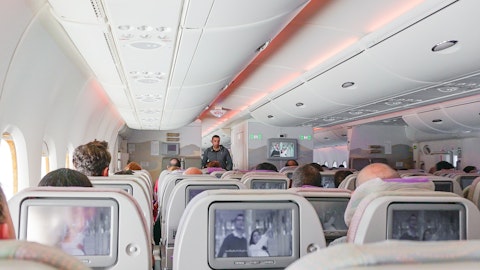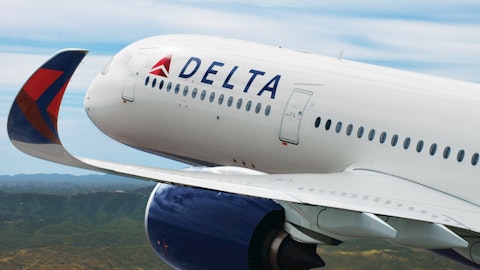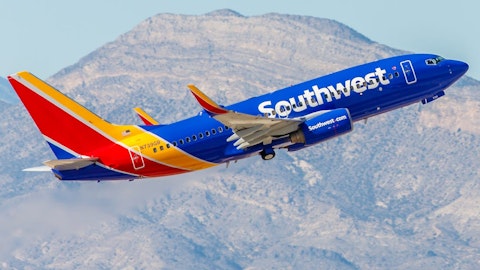Bob Jordan : Yeah. And if you take the data in January is very way down the weeds here, but it’s very polluted by the January 11 NOTAM issue, where there were all kinds of issues as well. for most of — prior to the day you’re talking about here, most of the day, I think the 15 days or so prior to that, we were 99 — in the 99-plus a couple of several days in the 99.9% completion factor range, several days canceling one flight. So you just have to watch the aggregate because if you have an anomaly in a day that’s very different, like the day Andrew described or the NOTAM day, it will throw that — it will throw it off. Obviously, you know that.
Andrew Watterson : I’d say in the NOTAM day, as I mentioned in my remarks, we didn’t push before the ground stop. So basically, that means we got a much later start because we were being safe, and we wanted the FAA to tell us that, that was validated before we pushed because of how we read the regulations. Therefore, we ended up with more cancellations that day, a significant number more than some of our competitors there. And so that inflates the numbers for January overall. But once again, it was safe and we ended up being set up nicely for the next day. And then lastly, when you look at our competitors, don’t forget, they outsource 40% to 50% of the departures to some low wage regionals on behalf. Customer doesn’t realize that. So when they give you a number that says, cancel this many, make sure you’re including all the branded operations, not just their ma inline.
Brandon Oglenski : And for sure, we do look at seats and flights impacted. But I guess coming off this call, where is the urgency to ensure that specific to you guys this doesn’t happen again? I mean, does it come in the form of more urgency on the pilot contract? Do you need to look at more non-aircraft CapEx? I mean just help investors get their arms around it, please.
Bob Jordan : I think the urgency is across the board. There’s nothing — everything is on the table. And as Andrew pointed out, we went through in these remarks, we have things that we’re doing right now, early warning dashboards, staffing up, crew scheduling, we’re looking at de-icing procedures top to bottom. We’re buying more in covers for extremely cold weather. We’re looking at fuel mixes for ground equipment when you have sub-zero temperatures on and on and on. We’re also waiting patiently here. And it will be weeks, not months, to get the Oliver Wyman report to understand root causes and what we need to do there. But we will do everything that it takes whether that is buying engine covers, technology changes, whatever that list may be to ensure that this kind of event doesn’t happen again.
I disconnect contracts because the — we’ve had — we’ve made great progress. We’ve got — we’ve gotten 5 agreements here in the last couple of months with our unions. I’m very, very proud of that — and our negotiators, and I’m very proud of our union partners. We have a couple more to go. We’re making, I think, really good progress. We have two of those that are in mediation. Pilot applied attendance. That mediation process is a defined process controlled by the mediator. The mediator controls the schedule, the meeting times, the meeting dates, but we’re making progress in both of those as well. We’re eager to finish those up. Our employees are terrific. We’re going to — we’ve always paid well and we’re going to pay well. We’re going to have market competitive compensation.
You know that. We know that, and our employees know that. So I am eager to wrap those up, but mediation is a process.
Andrew Watterson : I’d say we know what happened to the last on the fall as I call it. We’ve put in place with urgency. And that was the urgency we had, make sure the same thing doesn’t repeat itself. So we have the safeguards for that same thing not to repeat itself, but we think there could be common root causes. That’s why when we take the time between the weather starting and us getting to that kind of position with our crew scheduling software. Lots of decisions were made, lots of coordination between ground operations, our control center, our crew scheduling. Lots of equipment that was used to handle cold weather. Something in there in that sequence of events led us to the spot where we were at the end. And so immediately protect that situation to not happen again and then follow the string upstream to find the series of actions that led us to there and resolve those.
And so that’s what we’re taking the time to do. It’s a couple of weeks. I think it’s worthwhile to take a few weeks since we have the kind of emergency stuff done to find those root causes that you can address, and that may require incremental spending or maybe incremental management effort, and we shall see. But we certainly have intention and plans to have that start up right away after that report is done.
Bob Jordan : And then I know we’re going on and on. It’s just so important. The last thing I would add is that we — while this event was something significant and something we are absolutely not proud of, we’ve got a 51-year history of operating really, really well. We were operating really well prior to this event. We had good performance in ’22 leading up to December 21, good performance at the holidays, Thanksgiving, Labor Day, et cetera. So never forget that we are — we haven’t always — always will be a terrific operator. The main point here is we will attack this head on whatever we need to work on here. Especially once we understand the OW report, we will attack it with a sense of urgency. We will boost our spending, if that’s technology if we need to, but we will do everything to double down to make sure that this does not happen again. It’s critical.
Brandon Oglenski : Thank you.
Operator: Thank you. And the next question will be from Jamie Baker with JPMorgan. Please go ahead.
Jamie Baker : Good afternoon. Is interlining off the table?
Andrew Watterson : I don’t think interlining changes. If we had interlining there, then there may be some subset of customers that we could have reaccommodated. But other airlines were full this time of year as well. So we would have still had the same event. We still would have in this discussion even if we had interlining. Now domestic interlining has prohibited the scope agreement with our pilots. So we have to get scope relief to do that. But should they accommodate us there and we put an interline, that made the margin help with some level of disruption, but you would still have the large, large majority of people would not have been accommodated through a direct interline.
Jamie Baker : And second, Tammy, thanks for including the fact that you’ve updated your labor cost accruals. Just to clarify, the industry convention seems to be to exclude any planned retro pay or signing bonus. I assume that’s also true for Southwest.
Tammy Romo : Jamie, we’re doing our best to include the total cost to get these labor agreements over the finish line here. So as we shared back in December, the environment is dynamic, and we’re continuously evaluating that. But our estimates include the total cost, I guess, is a better way to say that, to wrap up our contracts as well as recently, of course, ratify contracts.
Jamie Baker : Got it. I’m sure you’re looking forward to locking down the contracts. So I’ll stop hounding you about it. I appreciate it. Thank you, everybody. That’s it for me.
Tammy Romo : Thanks, Jamie.
Operator: And our next question is from Duane Pfennigwerth from Evercore ISI. Please go ahead.




